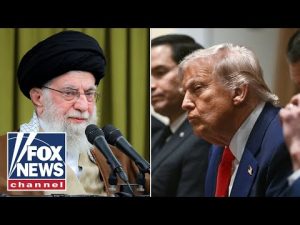In recent days, the world has been ablaze with reactions following decisive U.S. military actions in Iran. This development seems to have been greeted with cheers from certain quarters in Israel, notably within the fractious fields of Israeli politics. Even those who are frequently at odds, such as the former Prime Minister of Israel’s opposition party and current Prime Minister Netanyahu, found a rare moment of agreement. Perhaps when it comes to curtailing threats from Iran, rivalries can be set aside. Both leaders praised President Trump and the American armed forces for launching attacks intended to prevent Iran from pursuing a nuclear weapon, though one could hardly suppress the chuckle at this unexpected unity.
The logic behind these military actions seems clear enough for any seventh grader reading the news. Iran has posed a persistent threat not just to Israel but to the stability of the entire Middle Eastern region, and from the perspective of several global observers, a nuclear-armed Iran would only compound those fears. Imagine a region already fraught with tension being thrown into an outright nuclear arms race. It’s a terrifying thought—one that rightly encourages preventative measures. For the people of Israel, resilient as they are, a goal focus on neutralizing this threat before it matures fully is vital. The implications of a nuclear Iran surpass any geographical confines, threatening countries from the tip of the Middle East to airports in North America.
Curiously, as can be expected in these times, a vocal minority in the U.S., led by certain members of Congress, responded with stringent opposition to the action taken. These are voices invoking the cause of peace while overlooking the history of force that regimes like Iran’s have deployed. Their objections conveniently ignore the sponsorship of terror by the Iranian government that plagues the world. It raises the question: at what point does stopping a threat become the lesser evil compared to allowing it to grow unchecked? The intellectual gymnastics required to view inaction as a path to peace are, frankly, entertaining yet concerning.
One might see wisdom in choosing strength to guide any long-term peace aspirations. Perhaps this is why President Reagan’s doctrine of ‘peace through strength’ resonates so soundly when applied to current events. The recent actions of the United States are a reminder—not only to adversaries but to allies alike—of where global power resides. Such displays of might aim to reinforce the point that democracy will be defended and that there’s no room in the global theater for threats of nuclear weaponry, even if, amusingly, some still opt to hide such ambitions in mountain bunkers.
The discourse over Iran’s nuclear program continues, with voices pointing out Iran’s claims of pursuing a civilian nuclear program in the same breath as hiding their true intentions in mountains. If constructing power plants were the actual endgame, transparency would suffice—yet the secrecy and enrichment of uranium to a level only necessary for weaponization tell a different tale. President Trump and the U.S. forces, according to some commentators, potentially averted an altogether more disastrous future scenario with this bold intervention. For this, they have earned words of gratitude from global allies, reminding some of us of a time when decisiveness wasn’t just a talking point but an action-backed principle.







